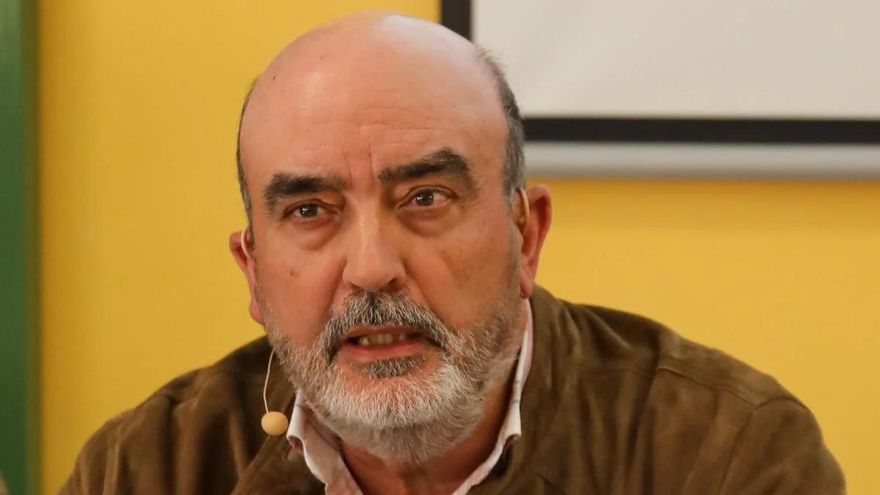
You are in luck: the beloved son of Teror and president of the Canarian Academy of Language. In addition to his cultural contributions, he has received various accolades in the town, where he served as a preacher during the Pino Fiestas in 2014.
That’s the privilege of age; one has experienced nearly everything, wouldn’t you agree? The people around here have great affection for me. I spent my entire professional career in Tenerife at the University of La Laguna, as there was no University of Las Palmas when I was younger. I studied at the Faculty of Philology. Well, I recently retired around five months ago, having turned 70.
Regarding the position you held between 2012 and 2015, how do you view this legislature?
The previous president, Humberto Hernández, is a lifelong friend and colleague. He has done an excellent job for seven years leading the Academy. The overarching aim remains unchanged. Some believe that the standard of language in the Canary Islands is poor, with limited fluency and vocabulary. This is attributed to that “complex” related to peninsular Spanish. However, these notions are not prevalent at all, especially not among the youth.
Are we making progress or are we stagnating?
Years ago, there was a significant level of illiteracy. In predominantly illiterate societies, such complexes can easily arise, as linguistic insecurities are often connected to a person’s educational background. An educated individual, who has read, travelled, and developed themselves, will not possess such insecurities. Conversely, someone who feels inadequate or unconfident about public speaking usually harbours underlying cultural issues. Ultimately, linguistic complexes stem from cultural insecurities.
Globalisation has altered the Canarian lexicon; is there a reconciliation between this and the inclusion of anglicisms in Spanish?
Matters relating to language should be approached with a degree of naturalness. Nothing is inherently wrong. Has society become globalised? Yes. This reality influences our speech, leading to the incorporation of anglicisms. The traditional vocabulary is diminishing more in urban settings than in rural areas, where the change is slower due to lesser exposure. Urban locales have always been linguistically innovative, while rural areas tend to be more conservative.
Some lament the demise of the Canarian dialect as though it were a tragedy.
We shouldn’t exaggerate. Many declare that “no one uses Canarian vocabulary,” but this is untrue. At least half of the vocabulary encompasses terms and notions unique to the Canary Islands. Take the word “tabaiba,” for instance; it won’t vanish because it describes a plant. Words like Folia, Isa, and Malaga, which are Canarisms, will also endure, as will many others such as Pope, Guagua, Habichuela…
Which terms are endangered?
For instance, “Magua”, “enchumb”, and “Guineo” are among a collection of more abstract words. These are verbs and abstract adjectives lacking a distinctly referential quality. Such terms are likely to fade away along with specific phrases as they fall within that less concrete vocabulary.
Is it possible to recover lost words? Can your narratives contribute to this?
Writers have the capacity to revive words. There are words that may lose their literal significance, yet their metaphorical essence remains intact. Or they might exist within a common expression. However, it’s not about initiating a crusade to restore traditional vocabulary via literary endeavours, as that could end up looking somewhat farcical. You can’t simply declare a word dead; many might just resurface naturally.
What are your thoughts on the term “weft”?
This is quite an intriguing case, as it originally was a traditional Canarian noun, but I fear a new usage is spreading from Gran Canaria to other islands. Young people have transformed that word into an adverb, often expressing phrases like: “This is beautiful.” The scenario concerning “fleje” is fascinating because it not only highlights the preservation of a word but also showcases a significant grammatical shift.
Is “you” being demonised?
This serves as a prime example. The use of “you” among Canarians, except in La Gomera, where it is commonly employed, seems to imply a lack of loyalty. Young individuals frequent social media and blogs, where “you” is prevalent. They use it quite naturally, and that doesn’t mean they are any less Canarian or overly pretentious. Times have changed. Personally, I am not fond of hearing “you” from a Canarian, to be frank, but it does not signal the demise of Canarian identity each time someone uses “you.” I wouldn’t consider taking legal action over it.
Why is there such alarm? Could seseo be at risk of disappearing?
I don’t see many people pronouncing “Z”. Doing so would sound unnatural, wouldn’t it? From a pronunciation standpoint, Canary Islands Spanish remains unaltered. Pronunciation is crucial. Then there are also grammatical factors. I firmly believe that for each instance of “you” used by people here, there are perhaps 300,000 “you” instances being employed. We tend to overemphasise these concerns. It’s important to not take things too seriously, as languages evolve. This is part of linguistic freedom, as the use of language embodies the essence of such freedom.
A new storyteller is discussed in the press with the release of The Weaver of Dreams and Other Narratives. Is this a reference to the myth?
This is simply a tale where the protagonist, in her youth, was a wool weaver. The narrative unfolds a series of adventures, romantic encounters, aspirations, and unrealised dreams. This collection is set to have 12 stories.
















